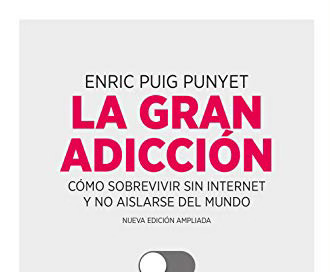Review #1 of 2024: La Gran Addición
¿Dondé debemos usar el internet en nuestras vidas cotidianas?
Reseña Corta en Español:
Se dice que para aprender un idioma completamente, necesites querer a saber qué, exactamente, personas dicen en esta lengua. Por esto, pienso que es muy importante para mi a explorar pensadores, autóctonas al español que escriben sobre temas que me interesan en ingles. La cultura de "sin internet", o reducción del uso del internet, es un de esas temas (hay un nivel de ironía en escribir esta reseña por Goodreads :), por supuesto) que me interesan desde el comienzo de la pandemia en 2020.
Este libro de Enric Puig Punyet (un filosofo catalán) trata de doce historias diferentes sobre personas europeos que han dejado atrás el internet pero todavía viven vidas normales por gran parte en las ciudades (hay solo un capitulo sobre una familia en el campo). Estas personas tienen diversas razones para vivir sin internet, pero la mayoría de las se centran en el aislamiento del mundo real, la adición a la información basura, y la desperdicia del tiempo.
Conocía ya la mayoría de estas criticas del internet (de criticas de la tecnología como Neil Postman, Nicholas Carr, Marshall McLuhan y Jacques Elull). Y con la mayoría, las estoy de acuerdo. Pero este libro fue publicado hasta ocho años. Hoy en día, especialmente después de la pandemia y en mi país (los Estados Unidos) es mucho más difícil a desconectarse. También, he obtenido muchos bienes del internet. He aprendido español por internet, y también forjado muchos amigos por Strava y Goodreads. Pero hay una hora y un lugar para el internet y pienso que da muchos beneficios, para todos a reducir nuestro uso de esta tecnología.
Como voy a cambiar mi vida por este libro: Pensar por qué y para qué necesitaría usar el internet antes de hacerlo.
More thoughts on Internet Use (English)
This book, only available in Spanish, interviews ten individuals (who are often part of families), who took the extreme path of completely excising the internet from their lives. The astute reader of this substack, almost certainly reading the post on their favorite web-browser, may be asking themselves why people might choose to do such a thing, and why I would choose to read review such a book.
I’m obviously not fully in support of the message of this book, which is to leave the internet behind completely. I need email, google, and zoom for my job. I keep in touch with friends halfway around the country using texting, calls, and goodreads. I keep up this substack, mainly as a writing exercise, but hopefully also for the enjoyment of my subscribers. I also do most of my banking, shopping, and consuming through the internet.
Yet I would like to think I am quite a bit less online than the median American or Western citizen. I try to limit my phone use to between the hours of 8am and 8pm. I don’t have social media. I still have a small, and old iPhone6.
Why the middle ground? There is clearly something wrong with what the internet is doing to society. Suicide and depression rates have risen in lockstep with hours spent online. The number of close friends that people have has been decreasing with about the same correlation, as people spend more time in front of their screens, and less socializing. The way the internet works these days is also ripe for graft: scams are abound, and even legitimate websites for banks and other real organizations are byzantine and filled with fine print. And at the end of the day, the internet is virtual, not real. The simulacrum of reality that our screens feed to us will never be as rich, or as detailed as the world outside. These problems are only going to get worse, as the ability of AI to prey on our most base instincts improves.
However, the internet has also brought me a lot of good, mainly in the form of knowledge and social connections. I learned Spanish through the internet, met my current roommates, my now ex-lover, and many of my friends from philosophy book club. I also need the internet for work, public transportation, and just scheduling my social life. So unlike the examples in this book, the internet, at least for now, is here to stay in my life.
I think what this book does for me, with echoes of Cal Newport’s Deep Work, is to get me to examine what I really need the internet for. As Punyet points out in his polemic at the end of the book, once a tool becomes a necessity, it ceases to be a tool and starts to become a crutch or a prosthetic. So often these days, it seems that mindless browsing of the various Internet forums or blogrolls is my default state of being (or worse compulsively checking texts). Rather than knowing the geography of the city I live in, I’ve become reliant on guided maps. And rather than think for myself, or reflect about a going on in my life, I turn to the internet looking for quick answers. These are things I think I can change without completely giving up the power of the internet.
So for the next month I’m going to try a little experiment.
Before I open an internet browser or my phone, write down exactly what I’m going to do and only do that.
Not using directions (maps allowed) within Baltimore City
When distressed, journal about it instead of looking on YouTube or Reddit.




